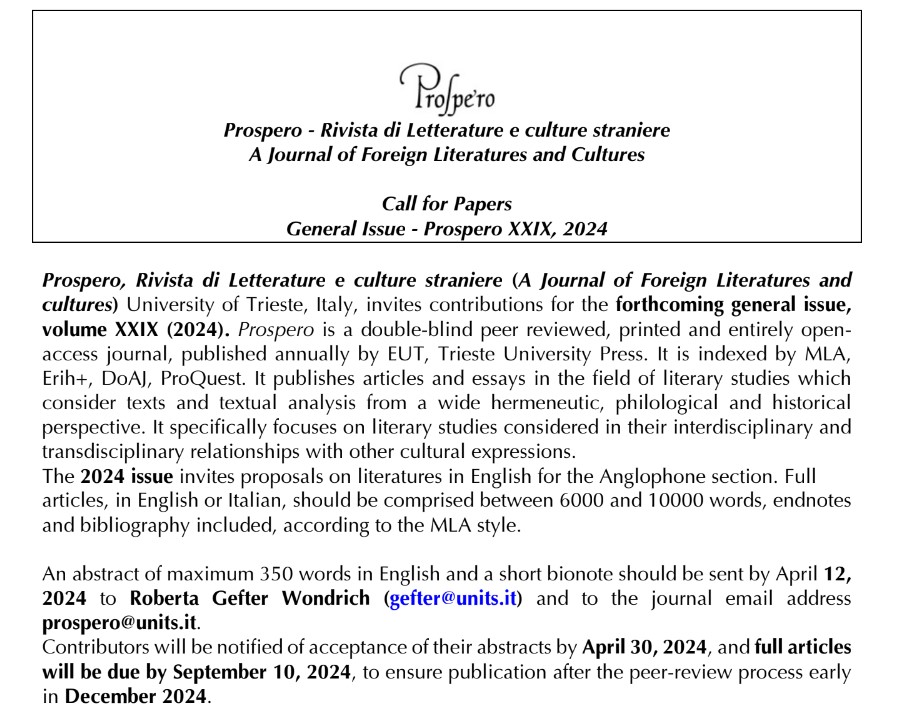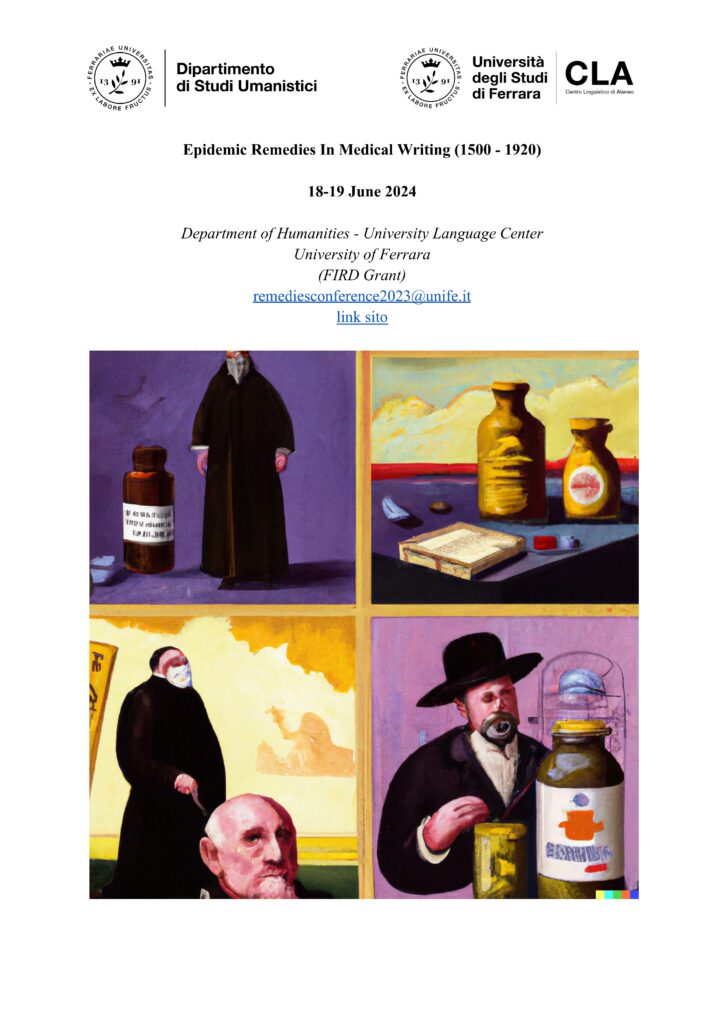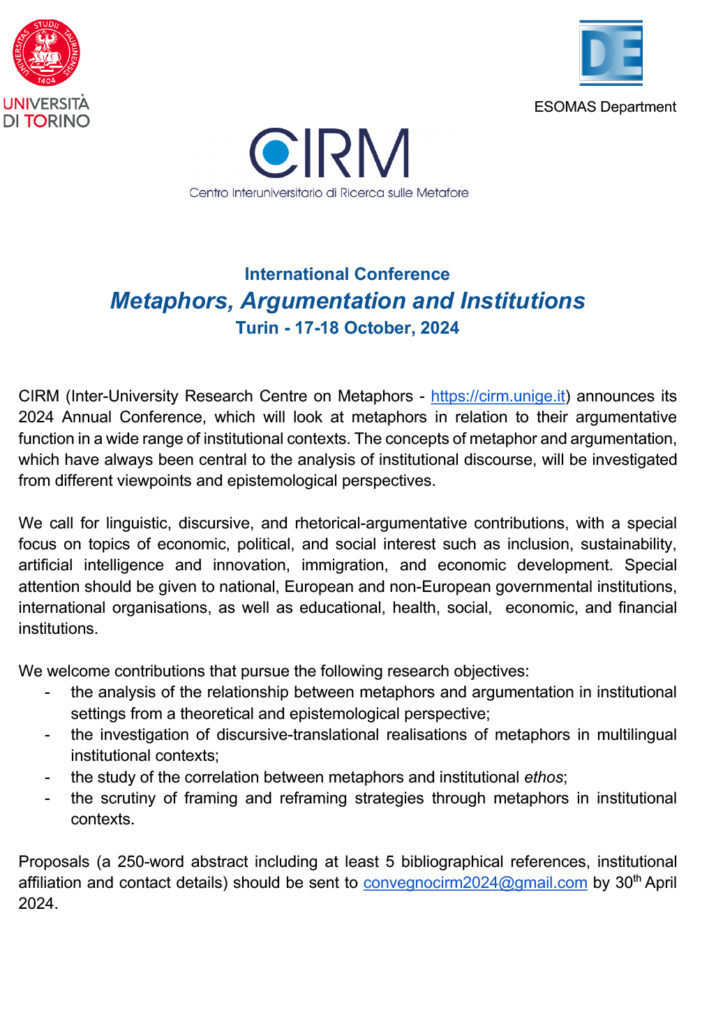CfP: Epidemic Remedies In Medical Writing (1500 – 1920)18-19 June 2024 Department of Humanities – University Language CenterUniversity of Ferrara (FIRD Grant)remediesconference2023@unife.it https://www.unife.it/it/cla/progetti/epidemic-remedies-in-medical-writing-1500-1920-les-remedes-contre-les-epidemies-dans-les-ecritures-medicales-1500-1920?fbclid=IwAR2D4Xg7cSfpsMbbZFgHPlRbJY3W_J7imetkSP7mE0zuw0g7q5GfyIbi-1M This conference aims to discuss the representation of epidemic remedies in medical writing in England and in France between 1500 and 1920. Prospective presenters are invited to address epidemic remedies across five centuries, bearing three main methodological observations in mind. Firstly, the pivotal role of the plague and the Spanish influenza as opening and closing points to the selected timeframe. Secondly, the working definition of “remedy” as a cure “for a disease, disorder, injury, etc.; a medicine or treatment that promotes healing or alleviates symptoms.” (OED, remedy 2). This comprehensive definition intends to allow for historical specification and diachronic terminological variation, which the prospective presenters are invited to explore and specify. Thirdly, the definition of representation as “the process by which members of a culture use language (broadly defined as any system which deploys signs, any signifying system) to produce meaning” (Hall 1997: 61), with particular emphasis on language use at lexical and discourse level, as well as the interaction between semiotic systems (e.g. word and image).A vast body of research has explored medical writing across the centuries. Several of these studies have delved into how text types, discourses, and specialised vocabulary evolve diachronically (Gotti, 2006; Taavitsainen, 2006; Taavitsainen & Pahta, 2011; Taavitsainen et al., 2022) as well as into how they manifest synchronically (Gotti & Salager-Meyer, 2006). Remedies, too, have been addressed from a diachronic perspective (Jacobus et al., 1990; Laycock, 2008; Mullini, 2013).The present aim is not only to offer a diachronic perspective on the linguistic and visual representation of remedies, but also to focus on remedies prescribed during epidemics, with a view to better understanding the history of medical and health communication.Potential research questions straddle multiple standpoints – historical linguistics, the analysis of discourse, the analysis of lexis, as well as images – and multiple text types (medical treatises, medical dictionaries, periodical publications, medical advertisements through time). They include but are not limited to: – The lexical description of remedies in medical writing– The metaphorical description of remedies in medical writing– The rhetorical construction of ethos in medical writing dealing with epidemic remedies– The visual representation of remedies in medical writing– The visual representation of remedies in newspapers/magazines– The linguistic-visual construal of remedies in texts containing multiple semiotic systems (i.e. advertisements)– the insurgence of misinformation and disinformation in/about health communication (these categories may be epistemologically relevant in papers dealing with the nineteenth and the twentieth centuries) We invite proposals from a wide range of methodological perspectives. To name but a few: corpus-assisted critical discourse analysis, critical discourse analysis, multimodal discourse analysis, historical lexicography and terminology, new historicism, cultural theory, epistemology, philosophy of science, gender medicine, and gender theory.Please submit a one-page abstract (ca. 200 – 300 words excluding references). Presentations (in English or in French) will consist of a 20-minute talk followed by 10 minutes for questions and discussion.All research papers should be delivered in person. All abstracts should be submitted to remediesconference2023@unife.it. All abstracts should be anonymised and include a title and up to five keywords. Key dates: – The call for papers opens on 15 January 2024.– The deadline for abstract submission is 30 March 2024.– Notification of acceptance (or rejection) will be sent out by 15 April 2024.– Registration commences on 1 May 2024.– The conference will take place from 18 to 19 June 2024. The conference is organized as part of the FIRD project “Il rimedio tra divulgazione scientifica e fake news in Francia e in Inghilterra nel XVI e nel XX secolo”, which is financed by the Department of Humanities at the University of Ferrara. Scientific and Organizing Committee: Dario Del Fante (Principal Investigator), Anna Anselmo, Daniele Speziari, Vera Gajiu. ReferencesGotti, M., & Salager-Meyer, F. (2006). Advances in Medical Discourse Analysis: Oral and Written Contexts. Retrieved from https://www.peterlang.com/document/1043716Hall, S. (1997). Representation: Cultural Representations and Signifying Practices. London: Sage.Jacobus, M., Keller, E. F., & Shuttleworth, S. (1990). Body/politics: Women and the discourses of science. New York : Routledge. Retrieved from http://archive.org/details/bodypoliticswome00jacorich10.1007/978-1-4612-4618-3_9Jones, C. (1996). Plague and its Metaphors in Early Modern France. Representations, 53, pp. 97-127.Laycock, D. (2008). How Remedies Became a Field: A History. The Review of Litigation, 27(2), 164–267.Montagne, V. (2017). Médecine et rhétorique à la Renaissance. Le cas du traité de peste en langue vernaculaire. Paris: Classiques Garnier.Ramsey, M. (1982). Traditional Medicine and Medical Enlightenment: The Regulation of Secret Remedies in the Ancien Régime. Historical Reflections / Réflexions Historiques, 9(1/2), 215–232.Taavitsainen, I., & Pahta, P. (2011). Medical Writing in Early Modern English. Cambridge University Press. Retrieved from https://books.google.it/books?id=JI8ZDwfcalQCTaavitsainen, Irma. (2006). Audience guidance and learned medical writing in late medieval English. In M. Gotti & F. Salager-Meyer (Eds.), Advances in Medical Discourse Analysis (pp. 431–456). New York: Peter Lang.Taavitsainen, Irma, Hiltunen, T., Smith, J. J., & Suhr, C. (Eds.). (2022). Genre in English Medical Writing, 1500–1820: Sociocultural Contexts of Production and Use. Cambridge: Cambridge University Press. doi: 10.1017/9781009105347Thomas, Daniel. (2022). La grippe espagnole 1918-1919. Le virus H1N1 et la grande pandémie du XXe siècle, Collection Les Cahiers de Rennes en sciences, 15, Rennes : ChantepieVinet, Freddy. (2018). La grande grippe 1918. La pire épidémie du siècle. Collection Chroniques. Paris: Vendémiaire




